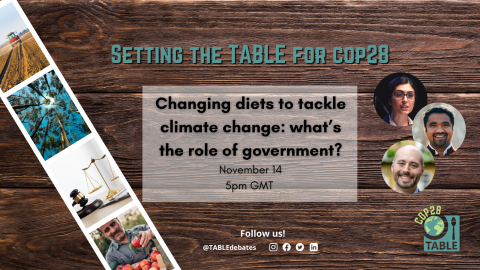
A large, robust and ever growing body of evidence concludes that if we are to achieve our net zero climate commitments and address our many SDG goals - from zero hunger, to good health and wellbeing, to responsible consumption and production - then diets will need to change. For rich countries which bear historical responsibility for the climate problem, in addition to balanced calorie intake and greater dietary diversification, citizens will on average need to consume fewer animal products (meat, egg, and dairy) and more plant based foods, including fruits, vegetables, legumes and wholegrains. But while the advantages for climate, biodiversity and human wellbeing of achieving such a change are potentially enormous, the obstacles are immense. They include, among other things, corporate investment in the unsustainable status quo, the entrenched nature and cultural importance of existing dietary patterns, and the need to ensure that the transition process overcomes, rather than exacerbates, existing social inequalities. Perhaps most important of all, the complexity of our global food system means the ability to effect change is always seen to lie with someone else. The facts that any one action is always going to be insufficient in and of itself (and may backfire) and that real change requires action by many different actors, can serve as an excuse for doing nothing. And yet if no one does anything, nothing will change.
In this webinar, organised by TABLE, we take a look at the role of one particular actor in the food system - Government - and ask what role Government can and should play in shifting diets in more sustainable, healthy and equitable directions. What are the essential ingredients of the policy-making puzzle? What are the obstacles against government action (ranging from corporate relocation, to voter hostility to moral objections to the state intervening in private affairs) and what might the counter arguments be?
Speakers:
Dustin Benton is policy director at Green Alliance, leading our work across energy, resources, and the natural environment, with a particular focus on getting on track to net zero emissions. Between 2020-21, he was on secondment with Defra, where he was chief analytical advisor to the National Food Strategy. Previously he led our work in the Low Carbon Energy and Resource Stewardship themes, focusing on energy efficiency, renewables, and CCS, and was an expert commentator on resource risk, plastics, circular electronics and the EU-wide Alliance for Circular Economy Solutions. Before joining Green Alliance, Dustin worked for the Campaign to Protect Rural England where he led work on the relationship between landscape protection, climate change, and new energy infrastructure. He holds an MA in Political Thought and Theory from the University of Birmingham and an MA in International Relations and French from the University of St Andrews.
Dhanush Dinesh worked as Head of Partnerships and Outreach of CGIAR Research Program on Climate Change, Agriculture and Food Security (CCAFS) to scale up Climate-Smart Agriculture prior to founding Clim-Eat. He is a Trustee of Plan Vivo Foundation and a Visiting Researcher at the University of Leeds. His previous work experience includes roles within the private sector, NGOs, and the UN system, in China, India, Thailand, and the UK. He has worked on a range of issues including forestry, environmental policy, climate change adaptation, and advocacy, at the national, regional, and global levels. Dhanush has an interdisciplinary academic background, combining an MBA from PSG Institute of Management and an MSc in Carbon management from the University of Edinburgh and has a PhD in Environmental Governance from the Universiteit Utrecht.
Arghanoon Farhikhtah is a Nutrition Mainstreaming Expert working on the Food and Nutrition Division team in support to Global Governance at the Food and Agriculture Organization (FAO) of the United Nations headquarters in Rome. She has 10 years of experience in various types of nutrition and health programme and policy work. Her role at FAO is centered on enabling healthy diets from sustainable food systems by working with multistakeholder platforms that provide support to Governments in transforming their food systems. Further, she leads cross-divisional efforts to enhance the food environment in FAO offices worldwide. Previously she worked as a Nutrition Officer at the UN World Food Programme (WFP) in Mozambique and headquarters in Italy. Her portfolio of work included nutrition and HIV programming, monitoring and evaluation, and social and behavior change communication in development and humanitarian settings. She holds a Master of Science in Nutrition and Dietetics from the Sahlgrenska Academy at the University of Gothenburg in Sweden and is a Registered Dietician and Nutritionist.
Chair: Dr Tara Garnett, Director of TABLE
The date of this event has passed and a recording and summary of it are available here.
To see the other recorded events in the series, view this page.

